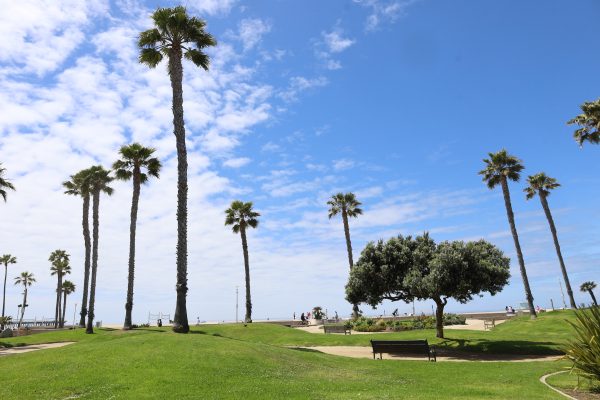
On the day that the Kettle opened in Manhattan Beach a little more than thirty years ago, back in the kitchen was sous chef with a mad gleam in his eye.
Don Dokken was living a double life. Sometimes, he’d work at the Kettle until 10 p.m., then run out the door and within an hour strap on a guitar and take the stage at the Pier 52 club in ? or Fleetwoods in Redondo Beach.
“Still smelling like French fries,” he recalled in an interview this week.
Other times, he’d gig first and cook later.
“The graveyard shift was the worst,” he said. “Sometimes I’d go in at midnight because I’d play from eight to eleven or twelve, and of course all the drunks come in at two in the morning. And no matter what you cook they don’t like it and send it back. You are just dealing with a whole restaurant full of drunk people ‘til six in the morning. It really sucked, but it paid my bills. It paid for my guitar strings.”
Those guitar strings would help him sell ten million records. The band he founded while living in the South Bay, Dokken, in the early 1980s became one of the most popular heavy metal bands in the world. Dokken, who this Sunday plays his first local club gig (at Brixton on the Redondo pier) in three decades, still has a house in Manhattan Beach (in addition to a mansion in Beverly Hills, where Kiss’s Gene Simmons is a longtime neighbor) and maintains strong South Bay connections.
“It all started with a local South Bay following,” he said. “Then I did what everybody did, hit the Sunset circuit, you know, the Whiskey, the Starwood, the Troubadour. That was like ’77, ’78. I was playing a lot with Van Halen in those days. Then they got signed in ’78 and everything took off.”
Dokken got his big break a few years later when German record producer Dieter Dierks heard him playing at the Whiskey. Dirks was in the process of producing what would become the Scorpions record Blackout, but lead singer Klaus Meine had just had vocal surgery and was struggling.
“My vibrato was very similar and my voice was very high – I was young and had a fresh voice, so he said do you want to go to Germany and do backgrounds on a Scorpions album? I was like, ‘Shit yeah.’”
In exchange for his help on the album, Dierks gave Dokken five days in the studio. He recorded a demo which led to a record deal in Germany. That first record, Breaking the Chains, was initially released only in Europe and made the band popular there. That in turn led to an American record deal and regular rotation on the newly launched MTV music video network.
“The joke was they didn’t have any videos,” Dokken said. “”So if you had a video on MTV, they played it every 45 minutes…they just played it over and over and over again.”
The attention landed the band a tour, in 1983, with Blue Oyster Cult. In a few short years, Dokken had gone from the Kettle to an arena concert tour. He had become a rock star.
“It was scary,” he said. “It was scary enough playing the Whiskey for 300 people, and then all of a sudden we walked onstage in front of 10,000. It took a while just to figure out what the hell we were doing…you know, how to live on a tour bus, how to get on stage on time, how to hook up equipment quick – we only had 35 minutes, you know. We learned. It was exciting. We were all in our 20s. I had never done that.”
In 1984, the band broke big. Their album Tooth and Nail sold three million copies, and the following year, Under Lock and Key sold one million. They toured around the world with Judas Priest, Aerosmith, and Dio. In 1986, they embarked on a tour of Europe with the biggest, baddest metal band on Earth, AC/DC. Dokken said the experience toughened the band. Several other bands that had toured with AC/DC couldn’t take it.
“It’s pretty hard to play when 14,000 people are chanting, ‘Angus,’” he said. “I mean, it smarts a little bit. You are just going, ‘Oh man, this is brutal.’ So you either suck it up and throw down and go for it, or put your tail between your legs and go home. So we survived and became a much stronger band, I’ll say that.”
This was when Don Dokken became a wine connoisseur.
“It was kind of an accident,” he said. “You are travelling in France and you got five hours on a tour bus on a two lane highway, going through the south of France and miles of vineyards and these little houses. And we’d just stop, you know, and go up to these little vineyards and these little houses, and the guy would open a bottle of wine for us and give us a little cheese. It was kind of a rest stop. They were stoked to see a tour bus pull up and eight guys in leather jackets fall out of the bus. We were all kind of beat up looking and we didn’t speak French…but if we liked their wine we’d buy a case and stick it in the bottom of the bus and off we’d go.”
This was also the tour Dokken lost his bass player and his drummer, at least temporarily. The first time was still in France. A police motorcycle pulled up with its lights flashing, stopped the bus, and asked, in broken English, if perhaps they were missing anybody. Dokken counted bodies and realized bass player Jeff Pilson was missing. He was forty miles back, in the vineyards. When Pilson was retrieved, drummer Mick Brown harassed him mercilessly for breaking rule number one: don’t leave the bus without telling anybody.
Then, a week later, the band had just pulled into its hotel in Belgium after a 12 hour drive when they realized Mick’s bunk was empty. He’d gotten out at the customs station at the border, wearing slippers and shorts in the middle of winter, and wandered off in search of a proper bathroom. When the customs officers found him looking for the departed bus, he couldn’t tell them what country he was coming from or going to. Nor did he have a passport.
“We finally called the customs station and asked, ‘Is there a guy with really long blonde hair in a pair of shorts wearing a T-shirt that says Dokken Tour? They go, ‘Yep.’ ‘We forgot him, sorry.’ We called that the most expensive cab ride ever. We had to fax his passport for them and put him in a cab. It was like $800. So we put this big piece of paper on laminate and it said, ‘My name is Mick Brown. If found, please return to Dokken tour’ and a phone number.”
Dokken broke up in 1989 after the famed Monsters of Rock Tour (with Metallica and Van Halen), mainly due to tension between Dokken and lead guitarist George Lynch (Dokken at the time claimed that Lynch had threatened to kill him) and reformed in 1993, minus Lynch. The band’s popularity has persisted, particularly overseas, where they still fill arenas.
In recent years, Dokken has recorded a solo acoustic album that featured an all-star cast (including percussionist Tito Puentes) that he has not yet released.
“Some people say it’s too mellow…But come on man, you are in your ‘50s,” Dokken said. “Nobody is giving Robert Plant shit for being mellower. This is the guy from Led Zepplin and his shit is like adult contemporary. You do a solo acoustic album and people go, ‘Oh, you ran out of steam, you pussed out.’ I go, ‘No, I can still do that.”
To that end, Dokken put out Lightning Strikes Again last year, perhaps his hardest rocking work since the 1980s. He’s also been rerecording the band’s greatest hits (at Reef Studios in Torrance, actually). But last year, he toured alone with Queensryche, shocking his fans by playing solo acoustic sets. He gave away his acoustic album. The point is this: Dokken has made his money and can basically do whatever he pleases, but he’s still in it for one reason – the music itself.
“There’s been a million musicians I’ve met who say I want to be in a band to meet girls, or I want to be in a band because it’s cool,” he said. “But I’m like, ‘I am in a band because I am a musician, and that is what I do. I have to play music. That is my drug. When we played Pier 52 or Fleetwoods, I wasn’t thinking, ‘Oh yeah, man, in a couple years we are going to be famous. It kind of never really entered my head. I thought, ‘Yeah, we’ll do this, make our 200 bucks a night, and it’s fun. I never thought we’d end up selling three million records….I mean, we are very lucky. It could have been “Breaking the Chains” and back to the Kettle.”
“We don’t have to do this anymore,” he added. “We are financially set. We just go and play because that is that we do. We do it because it’s awesome.”
Mick Brown is the only other original Dokken member still in the band.
“It’s cool, man,” Dokken said. “Mick and I have been playing with each other over half our lives. We were just talking about this the other day. I go, ‘Jesus Christ, Mick, we’ve been together more than any of your girlfriends, or mine. We are like a married couple.’ He goes, ‘Yeah, I’ve been staring at your ass for 30 years.’ I go, ‘I never thought of that, you being on the drums, you’ve had to look at my ass all these years. That’s had to suck.”
The Brixton show is their final of the year. Dokken plans to mix it up, even throwing in a little acoustic mini-set. But he’s bringing his own sound system just because he wants to be damned sure he can still crank it up when he wants to.
“We are going to turn it down as much as we can,” he said. “But we can only turn it down so much. That is just the way we are.” ER










